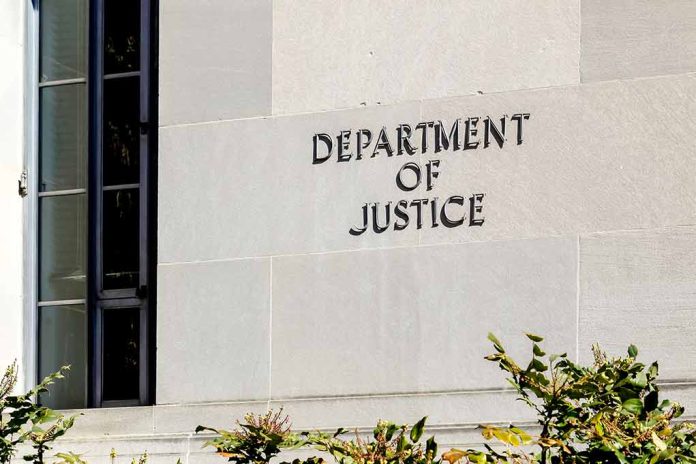
The Trump administration delivers a decisive blow to blue states pushing radical climate agendas as the DOJ files unprecedented lawsuits against Hawaii, Michigan, New York, and Vermont for threatening America’s energy security.
Key Takeaways
- The Justice Department has filed lawsuits against four Democrat-led states over climate policies that allegedly violate federal law and threaten U.S. energy security
- The DOJ specifically targets New York and Vermont’s “climate superfund laws” that seek to extract billions from energy companies for past greenhouse gas emissions
- Attorney General Pamela Bondi characterized these state actions as “burdensome and ideologically motivated” threats to American energy independence
- The lawsuits aim to preemptively block Hawaii and Michigan from filing planned litigation against fossil fuel companies
- The legal action follows President Trump’s Executive Order 14260, directing federal agencies to stop state laws burdening domestic energy development
DOJ Takes Aggressive Stance Against State Climate Initiatives
The Department of Justice has launched an unprecedented legal offensive against four Democrat-led states over climate policies that allegedly undermine America’s energy security. The lawsuits target Hawaii, Michigan, New York, and Vermont for actions the DOJ claims violate the Constitution and federal statutes governing energy regulation. These cases represent a major escalation in President Trump’s commitment to protect domestic energy production from state-level interference that his administration views as harmful to national security and economic prosperity.
“These burdensome and ideologically motivated laws and lawsuits threaten American energy independence and our country’s economic and national security,” Attorney General Pamela Bondi said in a statement announcing the legal action.”The Department of Justice is working to ‘Unleash American Energy’ by stopping these illegitimate impediments to the production of affordable, reliable energy that Americans deserve.”
The legal challenges come in direct response to President Trump’s Executive Order 14260, which directs federal agencies to take action against state laws that burden domestic energy development. The administration has framed these suits as essential measures to ensure American energy dominance and prevent blue states from imposing their environmental agendas on the national energy market.
Preemptive Strikes Against Planned State Lawsuits
In a particularly aggressive move, the DOJ has filed suits against Hawaii and Michigan to preemptively block those states from pursuing planned litigation against fossil fuel companies for alleged climate change damages. This unusual legal strategy seeks to prevent the states from even filing their intended lawsuits in state courts. The administration argues these potential state cases would improperly attempt to regulate energy policy through litigation, an area the federal government claims as its exclusive domain.
Michigan Attorney General Dana Nessel responded defiantly, calling the federal lawsuit “at best frivolous and arguably sanctionable” and vowing to proceed with her state’s planned litigation.
“If the White House or Big Oil wish to challenge our claims, they can do so when our lawsuit is filed; they will not succeed in any attempt to preemptively bar our access to make our claims in the courts. I remain undeterred in my intention to file this lawsuit, the President and his Big Oil donors so fear.”
New York and Vermont’s “Climate Superfund” Laws Under Fire
The DOJ’s lawsuits specifically challenge “climate superfund laws” enacted by New York and Vermont. These controversial laws impose strict liability on energy companies for their global fossil fuel activities, seeking massive financial penalties. New York’s law demands a staggering $75 billion from energy companies, while Vermont’s legislation seeks an unspecified amount. The administration contends these state actions improperly attempt to regulate interstate and international commerce and interfere with federal authority.
“When states seek to regulate energy beyond their constitutional or statutory authority, they harm the country’s ability to produce energy and they aid our adversaries,” said Acting Assistant Attorney General Adam Gustafson of the Justice Department’s Environment and Natural Resources Division.
The federal complaints argue that these state measures violate the Clean Air Act, which authorizes the Environmental Protection Agency to regulate air emissions and displaces state regulation of greenhouse gases. Furthermore, the DOJ contends these state actions encroach on the federal government’s exclusive authority to conduct foreign affairs, as they effectively seek to regulate global energy markets.
Protecting American Energy Independence
The Trump administration has positioned these lawsuits as essential defenses of American energy security in an increasingly competitive global environment. By seeking federal court declarations that the targeted state laws are unconstitutional and obtaining injunctions against their enforcement, the DOJ aims to clear the path for expanded domestic energy production without the burden of state-imposed climate regulations or liability schemes.
Some legal experts have characterized the DOJ’s actions as nakedly partisan. “What we expected is that they would intervene in the pending lawsuits, not to try to preempt or prevent a lawsuit from being filed. It’s an aggressive move in support of the fossil fuel industry,” said Michael Gerrard, a Columbia Law School professor.
The litigation represents a significant front in President Trump’s broader agenda to bolster American energy production, including plans to expand coal power and increase oil and gas development. By challenging these state climate initiatives, the administration is asserting federal supremacy in energy policy while delivering on campaign promises to protect American energy producers from what it views as overreaching environmental regulations.













